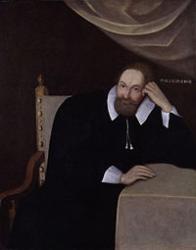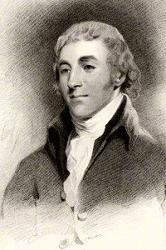Planning worship?
Check out our sister site, ZeteoSearch.org,
for 20+ additional resources related to your search.
- |
User Links
Person Results
‹ Return to hymnal


Export as CSV
Sir Henry Wotton

1568 - 1639 Hymnal Number: 876 Author of "How happy is he born and taught" in Christian Hymns for Public and Private Worship Wotton, Sir Henry, M.A., born in Kent in 1568, and educated at New and at Queen's Colleges, Oxford. After spending nine years on the Continent, on his return he became secretary to Robert, Earl of Essex, with whom he continued until Essex was committed for high treason, when he retired to Florence. There he became known to the Grand Duke of Tuscany, and was sent by him, in the name of "Octavio Baldi," with letters to James VI., King of Scotland, in which the king was informed of a design against his life. On succeeding to the English throne James knighted Wotton and sent him as ambassador to the Republic of Venice. In 1623 he was made Provost of Eton (having previously taken Deacon's Orders). He died in 1639. His works include The Elements of Architecture, Parallel between the Earl of Essex and the Duke of Buckingham, Essay on Education, &c. His poems and other matters found in his manuscripts were published posthumously by Izaak Walton in 1651, as Reliquiae Wottonianae. This has been several times reprinted
--John Julian, Dictionary of Hymnology (1907)
Sir Henry Wotton
Thomas Dale
1797 - 1870 Person Name: Dale Hymnal Number: 500 Author of "Dear as thou wert and justly dear" in Christian Hymns for Public and Private Worship Dale, Thomas, M.A., son of Thomas Dale, a bookseller in London, born at Pentonville, Aug. 22, 1797, and educated at Christ's Hospital, and Corpus Christi College, Cambridge, graduating B.A. 1822, M.A. 1825. On taking Holy Orders, he became, after holding several curacies, Vicar of St. Bride's, Fleet Street, London; Canon of St. Paul's, 1843; Vicar of St. Pancras, 1846; and Rector of Therfield, Herts, 1800. In 1870 he was nominated to the Deanery of Rochester, but died before induction, May 14, 1870. His poetical works are:—
(1) The Widow of Nain, 1819; (2) The Outlaw of Tauris, 1820; (3) Irad and Adah, a tale of the Flood; and Specimens of a New Translation of the Psalms, 1822. These Poems were collected and published in one vol. in 1836; 2nd ed. 1842.
From these works the following hymns have been taken:—
1. Dear as thou wert [wast], and justly dear (1819). Burial. In the Leeds Hymn Book, 1S53, and several American collections. It is from the Widow of Nain, and is given as a dirge sung at the funeral by the Village Minstrel.
2. 0 never, never can we know (1822). Good Friday. In the Baptist Psalms & Hymns, 1858-80.
3. Speak, 0 ye judges of the earth (1822). Ps. lviii. In the Mitre Hymn Book, 1836, &c.
4. The Lord Whose Name is love (1836). Children's Praises. In the Mitre Hymn Book, 1836.
5. When the spark of life is waning (1819). A Dying request. This is No. viii. of Poems, appended to The Widow of Nain, 1819, p. 69. In Stevenson's Hymns for Church & Home, 1873.
Other hymns of a similar character might be taken from these works with advantage. [William T. Brooke]
-- John Julian, Dictionary of Hymnology (1907)
Thomas Dale
George Dyer
1755 - 1841 Person Name: Dyer Hymnal Number: 147 Author of "Greatest of beings, source of life" in Christian Hymns for Public and Private Worship Dyer, George, B.A., 1755-1841. Educated at Christ's Hospital and Emmanuel College, Cambridge. The friend of Charles Lamb, of Priestley and Wakefield, and biographer of Robert Robinson of Cambridge. In 1792 he moved to London, to chambers in Clifford's Inn, Fleet Street, supporting himself by private tuition and literary work. He was a contributor to the Gentleman's and the Monthly Magazine, for which he wrote the introductory Ode in 1796. From 1809 to 1830 engaged upon Valpy's edition of the Classics, in 141 vols. Author of a History of the University and Colleges of Cambridge, 1814, and of several volumes of verse. Three of his hymns are in Kippis, and frequently in other books.
1. Greatest of beings, source of life. Hymn to the Deity.
2. Greatest of beings, source of life. The same continued.
3. Great Framer of unnumbered worlds. Hymn for a Fast
--John Julian, Dictionary of Hymnology (1907)
George Dyer
Thomas Gisborne

1758 - 1846 Person Name: Gisborne Hymnal Number: 478 Author of "A soldier's course, from battles won" in Christian Hymns for Public and Private Worship Thomas Gisborne was born at Derby, in 1758. He became perpetual Curate of Barton-under-Needwood, Staffordshire, in 1783, and Prebendary of Durham in 1826. He died in 1846.
--Annotations of the Hymnal, Charles Hutchins, M.A. 1872.
==================
Osborne, Thomas, M.A., son of Mr. John Gisborne, of Yoxall, was b. circa 1760, and educated at St. John's College, Cambridge, where he was 5th Wrangler of his year, and Chancellor's Medalist, graduating B.A. in 1780, and M.A. in 1783. Subsequently he became a Prebendary of Durham. He was the author of Sermons; the Duties of Men; the Duties of Women; Poems Sacred and Moral, 1799 (to the later editions of which his hymns were added), 3rd ed. 1803; and of another volume of poetry entitled, Walks in a Forest, 1795. The following hymns by him are found in the Uttoxeter Selection:—
1. A soldier's course from battles won. Soldiers of Christ. No. 72, in 6 stanzas of 4 lines, and in several hymn-books.
2. Hark! 'tis the bell with solemn toll. Death. No. 74, in 6 stanzas of 4 lines.
3. O Father, glorify Thy name. In Sickness. No. 92, in 5 stanzas of 4 lines.
4. Saviour! when night involves the skies. Christ All and in All. No. 80, in 4 stanzas of 4 lines.
5. Thy humblest works with full accord. Teachings of Nature. No. 118, in 4 stanzas of 4 lines.
6. When groves by moonlight silence keep. The hour of Peace. No. 116, in 4 stanzas of 4 lines.
All the above hymns, except No. 2, are in Gisborne's Poems, 3rd ed., 1803.
-- Julian, John, Dictionary of Hymnology (1907)
Thomas Gisborne
Mary Ann Roscoe
Person Name: Miss Roscoe Hymnal Number: 225 Author of "O let your mingling voices rise" in Christian Hymns for Public and Private Worship See Jevons, Mary Anne Roscoe, 1795-1845
Mary Ann Roscoe
Sarah White Livermore
1789 - 1874 Person Name: S. W. Livermore Hymnal Number: 223 Author of "Glory to God, and peace on earth" in Christian Hymns for Public and Private Worship Livermore, Sarah White, aunt of A. A. Livermore (q.v.), was born at Wilton, New Hampshire, July 20, 1789; and died there July 3, 1874, having spent most of her life as a Teacher. Two hymns were contributed by her to the Cheshire P. A.'s Christian Hymns, 1844:—
(1) Glory to God, and peace on earth, Christmas. (2) Our pilgrim brethren, dwelling far. Missions. She wrote many others, of which two are given in Putnam's Singers and Songs of the Liberal Faith, 1875.
--John Julian, Dictionary of Hymnology (1907)
Sarah White Livermore
J. Young
1800 - 1900 Hymnal Number: 170 Author of "O for a shout of joy" in Christian Hymns for Public and Private Worship Young, J. Under this signature two hymns are given in the American Baptist Psalmist, 1843: (1) "O for a shout of joy" (God's Eternal Love), No. 157, in 5 stanzas of 6 lines; and (2) "O Holy Lord, our God" (On behalf of Ministers), No. 952, in 4 stanzas of 7 lines. Both are still in common use.
--John Julian, Dictionary of Hymnology, Appendix, Part II (1907)
J. Young
Miss Simes
Hymnal Number: 678 Author of "'Tis summer, glorious summer, look" in Christian Hymns for Public and Private Worship
Miss Simes


 My Starred Hymns
My Starred Hymns


